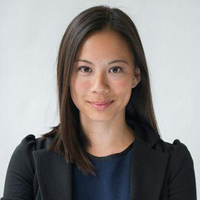 Every week we ask a leading figure in digital news about their work, their career and what it takes to be a journalist in the 21st century.
Every week we ask a leading figure in digital news about their work, their career and what it takes to be a journalist in the 21st century.Our guest this week is Denise Law, deputy community editor at The Economist. She gave us an idea of what her role entails in the newsroom and explained why empathy is an important part of her job.
What is your job title and what does that mean?
I’m the deputy community editor of The Economist, where I help to manage the publication’s social media efforts. We currently have a team of 10 journalists dedicated to building The Economist’s audience on social media.
We believe that there’s a whole universe of readers who should be reading The Economist, but who don’t know much about us: our role is to reach these audiences on the platforms where they spend the most time and to let them know that we cover more than just economics and business.
I’m responsible for overseeing the day-to-day operations of the team and ensuring that we’re experimenting, learning and applying best practice, daily.
I also oversee The Economist’s chat app strategy. We work closely with editors, data analysts, designers and developers to help shape what we do on social media.
How did you get started in journalism?
I left my home town of Toronto in 2010 to join the Financial Times’ Hong Kong bureau, where I covered China and South-East Asia for several years.
I was always interested in building digital news products. My first job was Greater China correspondent for an emerging markets startup called FT Tilt.
Sadly, it was shut down 11 months after launch. Its failure was an important reminder that media projects can and do fail – and that we learn from those failures.
What do you most look forward to at the start of your day?
My colleagues, who are among some of the brightest people I’ve ever met. I look forward most to debating with and learning from my fellow journalists, daily.
The Economist has an incredibly collegial environment where everyone is encouraged to openly share and discuss ideas.
What does a normal day look like for you? In emoji.

What three tools or apps do you use the most for work and why?
- Slack. I can’t live without Slack. My colleagues are all currently using it. I’m such a fan that I’ve even created personalised emoji for my colleagues.
- Asana. I use Asana to organise my, er, life! It’s a fantastic project management tool that my former manager introduced me to.
- Tweetdeck. It’s the most effective tool for monitoring what’s trending on Twitter.
Data analytics and web development skills, even if it’s a basic understanding of how numbers and code work.
You don’t need to be an expert, but learning the most basic skills can help you better understand, and empathise with the cross-functional teams you’re very likely to be working in.
What skills do you think are important to your role and why?
Empathy. Empathy helps you to not just better understand your team’s motivations, but also your readers’!
Curiosity. We don’t want to assume we know what audiences want, we need to constantly probe for answers and insights.
Teamwork. As an avid volleyball player, I believe that the best results come from teamwork. We work with a variety of other teams and the most effective way to get stuff done (and do it well) is through collaboration.
What has your current job taught you about the industry?
The importance of experimenting, iterating and learning quickly from your (ideally, small) failures, using data to help inform (but not drive) your process.
It’s totally acceptable to not have all of the answers. You learn by doing and collaborating with colleagues from different backgrounds and experiences, not by strategising alone.
Opinions should be backed up by data.
What would you say to someone applying to work at your organisation?
Be globally curious.
What is the best piece of advice you have ever been given?
To be interesting, be interested! I’m a Dale Carnegie fan.
Check back next week for a new look into the media industry – in the meantime, you can read through our other weekly interviews with digital media experts.
Free daily newsletter
If you like our news and feature articles, you can sign up to receive our free daily (Mon-Fri) email newsletter (mobile friendly).
Related articles
- New European journalism database facilitates cross-border collaboration
- Five ideas to boost community listening projects
- AJP asked 5,000 people in the US what they want from local news
- Local journalists are vital forces in the fight for social justice
- Govanhill sees journalists back at the heart of the community









